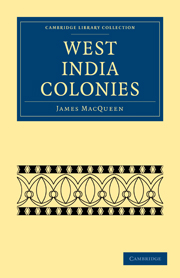Summary
THE next point which merits our serious Consideration, is the bold and imprudent assertion, that the labour in India is performed entirely by free men; that there are no Slaves in India, and therefore that the produce of that part of our Empire should have a decided preference over, and meet with every encouragement before, our West India Colonies. “Mr. Cropper's views on these subjects” says the Reviewer, “are equally enlightened and profound” Well, let us attend to them for a moment. “It bas been asserted, that encouraging Sugar in the East Indies is only employing Slaves in the East Indies instead of Slaves in the West. Now, to this I give” says Mr. Cropper “an unqualified negative. No Slavery does exist in Bengal, or the Northern Provinces where Sugar is cultivated.” Such are the enlightened and profound views of Mr. Cropper. Let us put them to the test by “Superior” and better authority. “Slavery” says the Reviewer, on the authority of that unimpeachable authority, Sir Henry Colebrooke, “is not unknown in Bengal. Throughout some districts the labours of husbandry are executed chiefly by bond servants. In certain districts the ploughmen are mostly Slaves of the peasants (Slaves of the peasants!), for whom they labour, and in some places the landholders have a claim to the servitude of thousands among the inhabitants of their estates.”
So much for Mr. Cropper's “profound” knowledge.
- Type
- Chapter
- Information
- West India Colonies , pp. 92 - 118Publisher: Cambridge University PressPrint publication year: 2010First published in: 1824



